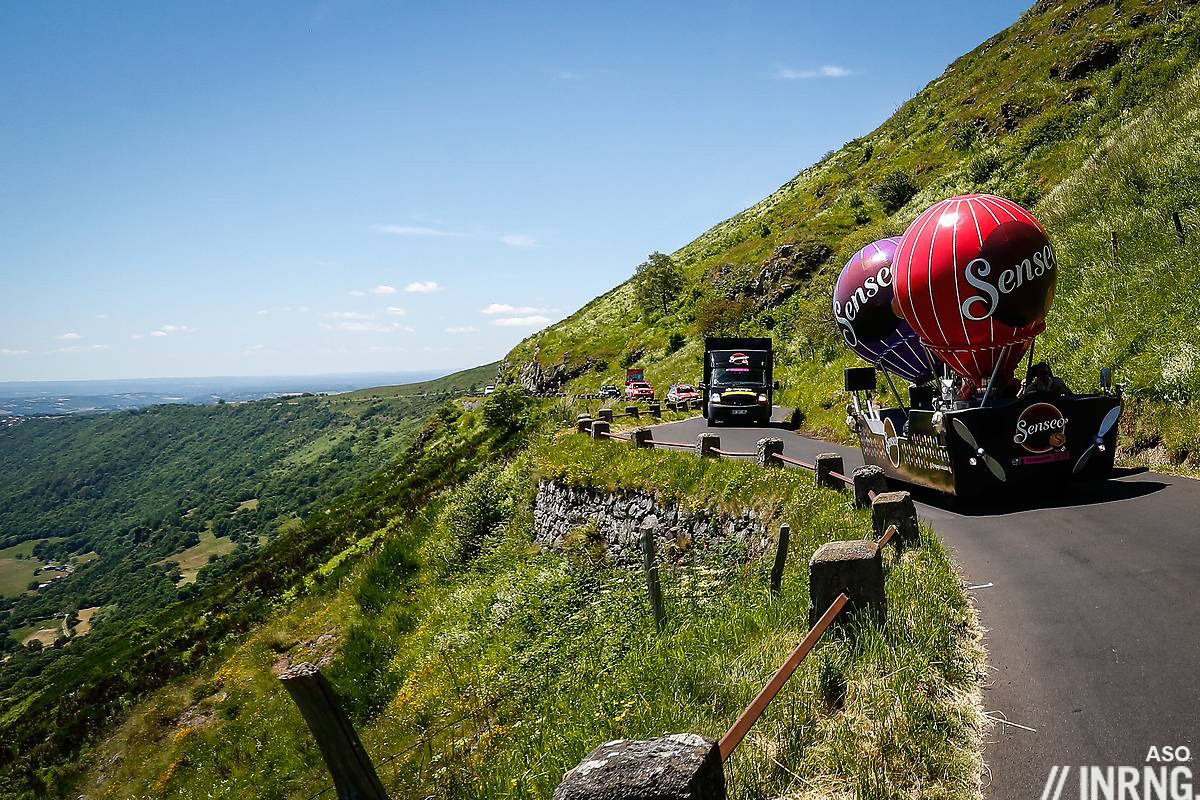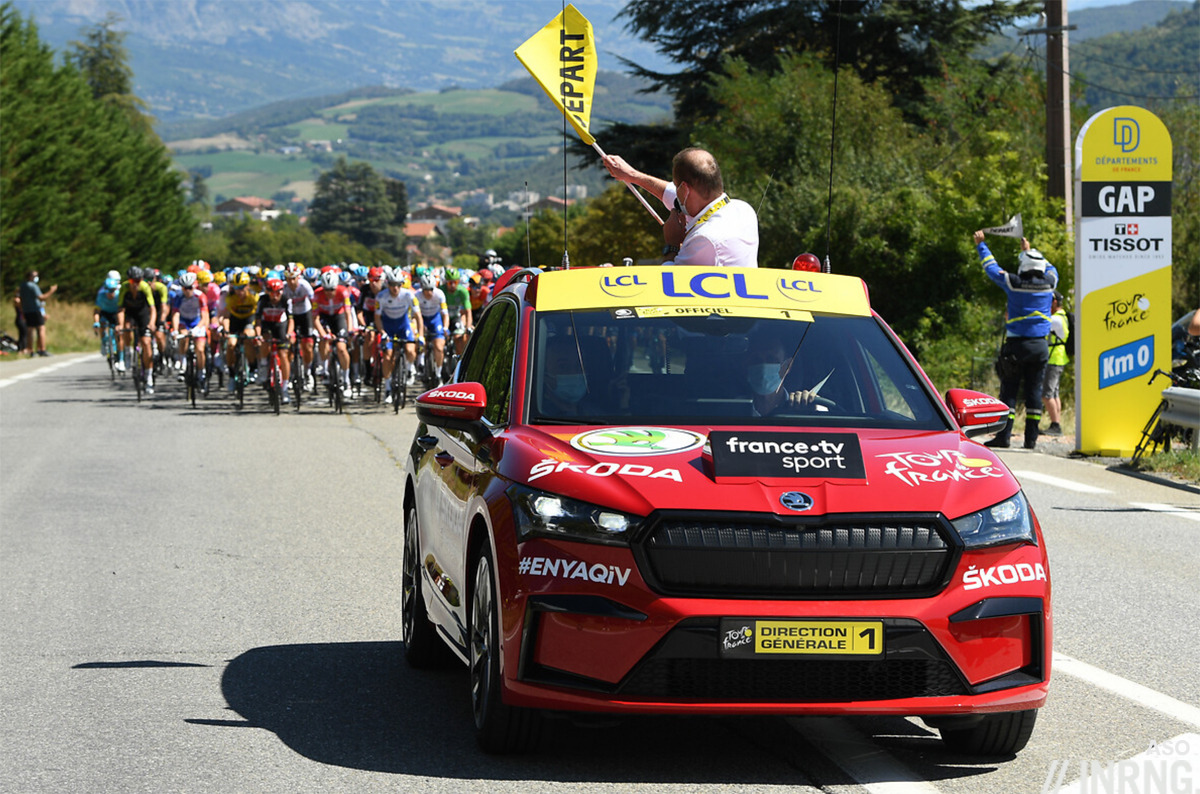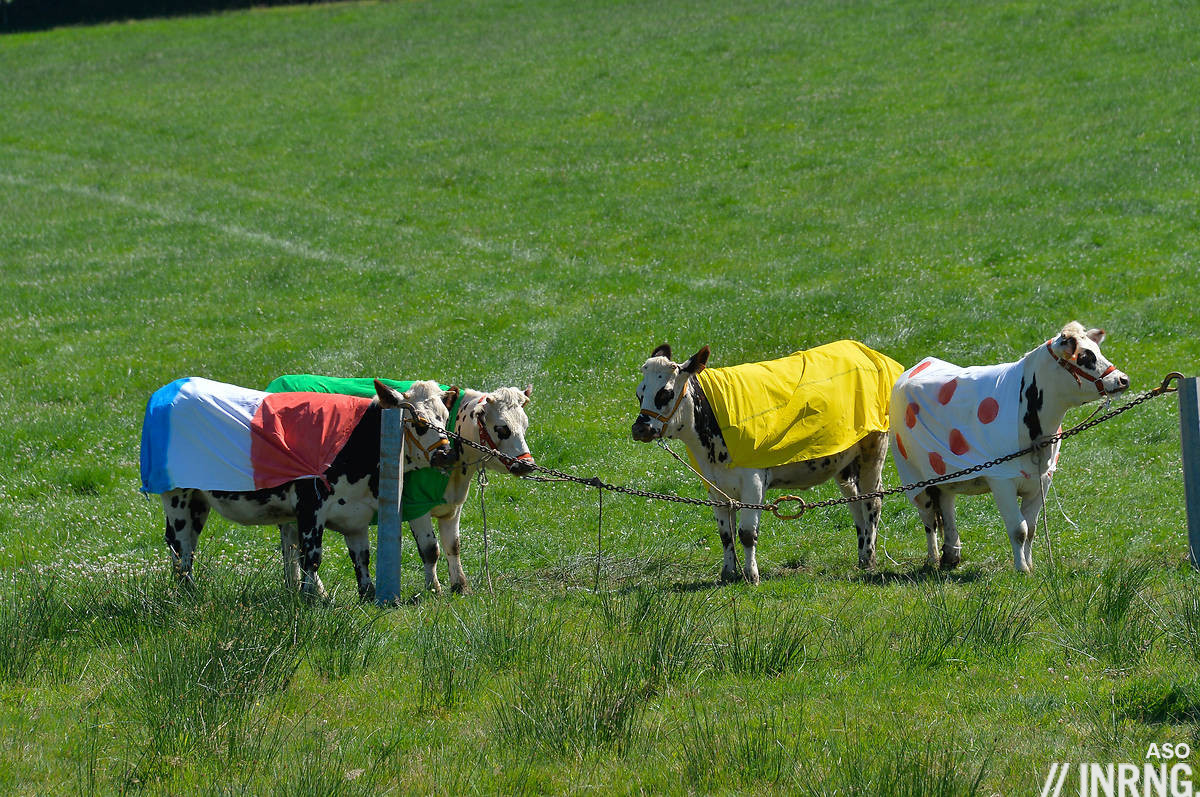You probably know the 2021 Tour de France won’t start in Copenhagen any more, instead it’s been switched to Brest, on the western tip of Brittany. Behind the decision there’s been politicking as the city of Rennes was also a candidate but it rejected the Tour, the new local government said non on environmental grounds and this is likely to be a trend in France, the Tour and other races must change to meet and reflect new environmental demands.
Mayors make the world go round
The background is environmentalist politicians did well in France’s recent municipal elections, political commentators have dubbed this a “green wave” and the écologistes are now running major cities like Bordeaux, Lyon, Strasbourg, Poitiers and Grenoble. This is connected to the Tour de France because local government is essential to the race. In the pre-Covid days the majority of people you saw on the podium shaking hands with the day’s stage winner were mayors and regional government officials, they’re a big part of the Tour’s VIP clientèle. Similarly when the Tour route is unveiled each October in Paris mayors are a large part of the audience in the auditorium too. They’re the Tour’s customers, France has a layercake system of regional, departmental, city, town and village government and mayors matter. Hosting fees are a portion of the Tour de France’s income, these days the passage matters more than the payment and it’s about having enough towns along the route to visit. But some are starting to say non to the Tour.
Why? Because the Tour’s not very environmentally-friendly. As a travelling circus with thousands of vehicles the carbon footprint is enormous. People often ask why aren’t there electric cars and the answer is simple: they don’t have the range. If a car can do an advertised 300km on a full charge, stick bikes on the roof and you ruin the aerodynamics so the range shrinks. Plus a team has to drive to the start, drive the stage and then drive to the hotel in the evening so the distance travelled each can can be double the day’s racing distance. Then good luck finding a charging point in your hotel in rural France. The Arctic Race of Norway is 100% electric for its race vehicles but it’ll be a while before the Tour gets there although this is as much a policy issue for France as it is a decision for the Tour.

Another big objection is the naked commercial aspect of the Tour, some councillors are against le sport business. They question spending taxpayer money on hosting fees, and the value in repairing roads just for the race, rolling out a carpet of fresh black tarmac so multinational companies can hurl plastic goodies at people while teams, some promoting big polluters and despotic regimes, bask in the limelight. Now you might think they have a point; or you might disagree and say the Tour is good for business, thousands of hotel nights, a big draw for tourists and more. Both can hold true, no? Plenty of other local politicians, including greens, think this as well but there’s a growing cohort of Tour skeptics and they look set become a feature of French politics.

The Tour won’t be shut out, it’ll change. It’s started, a first this year is that all the Tour’s official vehicles are hybrids but it’s a gesture and part-marketing on behalf of Skoda too. The publicity caravan is changing, the idea is to throw out less plastic junk and instead supply more useful gifts but it’s all relative, we’re still talking a convoy of trucks driving around France to launch freebies at people. The Tour has a publicity campaign to get people cycling, expect this to grow. The podium protocol has changed, it’s not just Covid but a desire for equality that’s resulted in the new format of male and female hosts, and the same spirit is behind the planned eight day women’s stage race due for 2022. This works both ways too, if politicians want a greener tour, up to them to provide the infrastructure such as electric vehicle charging stations and the Tour can publicise the investment in return. Up to them to make the French railways available for long transfers rather than aviation (it’s said the Tour would use the train but France’s railway company the SNCF won’t put on a train in case there’s a strike and the bad image goes global). If mayors want gender equality then if they bid for a stage of the Tour de France then they’ll surely bid for host a stage of women’s race too?
Conclusion
The Tour might exist inside a Covid-bubble right now but it’s part of French society, a cultural event as much as a sporting one and the race has always changed to reflect societal and especiallyconsumer demand. Mayors and local government underpin the race as hosts and are more are calling on the race to change. Thanks to France’s “green wave” there are a few more anti-Tour politicians in power but the reality is more one of more Tour skeptics; politicians taking a stand against such a cherished institution risk alienating voters. Instead there’s a push to change the race rather than block it and it’ll be interesting to see what the race looks like in a few year’s time.


Interesting parallels with local power politics and the US.
Minor typo: “ They ARE questioning using taxpayer money to pay hosting fees and repair roads just for the race”
Please feel free to zap this.
Zap
Ka-boom
Once EVs have the range and infrastructure then they’ll make much better team cars than petrol/diesel. There’ll be a lot less exhaust and brake dust to inhale for riders and the speed of the cars is much easier to control without the need for gearboxes.
Of course one negative aspect of an electric car is that they can appear beside you so silently as to be dangerous. I imagine many of us have experienced this on our rides – suddenly a car is right off your hip and passing too closely at the exact moment you’re not focused on holding your line along the side of the road. Of course there are solutions to this (e.g., fake engine noise piped through speakers, though this might negate the publicity if the public thinks they actually ARE running on gas engines).
I dunno…I hear tire/pavement noise no matter what sort the motor is.
Electrifying the Tour would possibly lead to more tourists using electric vehicles once they know the Tour has been thru and sorted out the charging. So maybe there’s an enterprising mayor thinking long term, and eager to make a deal with the Tour to split the cost of installing some charging stations (up to and including for buses – the teams will eventually want to try that too.)
Where I ride wind noise is sufficient (I’m either really fast, or I ride where there is a lot of wind – you decide) to cover the sound of tire noise. Where I ride no one uses snow tires, and trucks are rare, so electric vehicles tend to be quiet. And not all cars in the TdF have roof racks.
There’s always that contingent that believes “Loud pipes save lives.”
Road noise and the sound of the roof bars is fairly loud. I’d imagine those cool ‘honkity honkity’ horns are the solution to a quiet vehicle though
There’s a cultural adjustment to make, to get used to quieter vehicles approaching but overall being quieter has to be good for everyone.
Where do driverless cars fit in to this?!!!
Can I recommend this article by Iain Treloar…
https://cyclingtips.com/2019/07/the-things-thrown-at-me-by-the-tour-de-france-caravan/
In all this justified green wave the publicity by Ineos of a thirsty 4X4 tank substitute feels particularly inappropiate. What happened to Ocean Rescue?
The car stands out but several other sponsors have records that some can object to. But whatever changes come it’ll be very difficult for political pressure to change the sponsor make-up, there are easier “wins” for politicians before.
Thought provoking post, thank you.
Got me asking myself what changes to the excellent sporting cultural service the Tour offers me would I be prepared to accept in exchange for a single use plastic / carbon neutral / enviro positive Tour?
Lower standard of competition due to reduced budget?
Lower standard of competition due to lack of international travel by teams?
Reduced TV coverage? How reduced?
No Helicopter shots?
As a thought experiment what would I end the institution of the Tour in exchange for?
100% comprehensive traffic free cycle network across France?
All new vehicles manufactured to be electric?
Vive Le Tour
It’s a tricky cost-benefit. Against all of this is the idea of promoting cycling and sport, the Tour gets a lot of people on bikes and active and done right can be a good campaign tool. Sport and transport don’t always overlap but they can, eg the Col de la Loze is a cycle path and the Tour will make it world famous in the coming years, it’s promoting cycle-tourism. The Giro’s promoted the Sanremo cycle path on a reclaimed railway etc.
It does work. I found my passion for the sport as a direct result of a certain Tour that captured my imagination – so the job has been done here.
But, I’m still left asking myself, is that enough? Or rather, how much more could we do?
Let’s put even more tarmac down in the high mountains so even more people can come and wreck its ecology. Yay! And, of course, none of those hoards of cycle-tourists will get there by car or plane, will they? The idea that cycle-tourism is automatically an unalloyed benefit is part of the problem.
If something with the heft of the Tour could demand that authorities in the UK do the proper road resurfacing they should be doing anyway, I’d view that as a big plus, rather than an onerous burden.
Is the answer not to re-think the number of vehicles? Why not a few dedicated vehicles carrying spare bikes for team leaders and wheels / neutral bikes for everyone else?
Personally I think the Grand Tours’ trajectory will intersect at some point with races like the TransContinental etc and they will regain their epic quality, with long stages, self support etc, at least some of the time.
Interesting ideas Steve.
Your vehicle supposition might concern some bike manufacturers marketing departments who are heavily invested in seeing the peloton display their machines – and there we move closer to the axis of the dilemma.
Possibly but the race convoy is only a fraction of the Tour’s fleet of vehicles, special crash barriers need their own trucks. This would be a change in the sport but the teams would really push back against it, especially the big squads like Ineos, Jumbo etc as they’d hate the risk of puncturing.
Indeed. I know some people who work on the Tour of Britain, a relatively small race, and the fleet of vehicles required is considerable. The TdF must be enormous.
I’ve often thought it painfully ironic that a sport regarded as “green” produces such a lot of pollution, and it will be good if this is addressed. Even F1 has shown signs of recognising a need for change. Surely cycling can stay ahead of the game?
Ultimately these concerns seem to me to be mostly posturing and virtue signalling. I’m deeply committed to leaving the earth in better shape than it was when I came into it, and I’m conscious every day of not wasting, not polluting, etc. But I know my interest in both cycling and supporting professional cycling don’t register of the list of “stuff we need to fix to make the world better.”
Compare professional cycling, and esp. the TdF, to not having professional cycling. Of course it contributes some increment to air pollution, greenhouse gases, and junk in ditches along the side of the road. You could also argue that recreational cycling itself isn’t green, since making bikes and bike parts and associated paraphernalia require industrial processes that are polluting, with many of those products ending up in landfills sooner than they should. Strictly speaking, the world doesn’t need any of it. It’s not like agriculture, which feeds people. It doesn’t promote world peace. The exercise one gets from cycling could easily (for most people) be gotten by exercise with a smaller carbon footprint, like walking/running/hiking. And to the extent that it is a spectator sport, a case could be made that it’s a time waster.
But there’s a fundamental human need for sport, for games, for entertainment, for adventure, for testing oneself. We like to participate and we like to watch and we like to debate and discuss. From that perspective, most of these green concerns are trivial, like a neighbor getting agitated when they see the household next to them not properly recycling their bottles and newspapers as completely as they should (I lived in San Francisco for a bit, and this is a real thing – having someone go through your recycling bin and then trying to shame you for some transgression).
Think of the carbon footprint and pollution and waste of other popular sports, and their knock-on effects (potentially good or bad) with their fans. Cycling is more the model than the villain here, despite the relative absurdity of the TdF caravan. Compare the entire carbon footprint of the TdF to a single US professional or college football game, an F1 or NASCAR or Indy race, and it wouldn’t register. Compare how much the public pays for wealthy team owners to have the latest stadiums and tax benefits for their teams, and what those cities actually get in return. Do the fans of any of these other sports, aside from maybe tennis and distance running, get any healthier or any encouragement to be more physically active?
I know I’m preaching to the choir here, and I know the Tour needs to go with the times and make efforts to at least appear more green, but every step can be criticized (such as, where do those electric cars get their power? The sun, or from coal-fired power plants?)
I know every little bit helps and I think it is good if such a big event with such a big audience is changing (incrementally) to more environmental practices. But in the end it is not more than symbolic.
Why?
1. CO2 Emissions have risen over 40 % in the last 30 years. I highly doubt the Carbon footprint of the Tour has risen as much.
2. Over 30 % of global emissions are from energy and heating, which is nothing the Tour has the slightest influence on.
3. Nearly 12 % of global emissions are from road traffic. Probably most of it created by the transportation of good by trucks. Main reason behind this is sometimes the local infrastructure but mainly the delivery on time mentality in industry. It is cheaper to have goods constantly driven around than storing them in warehouses. Again nothing the Tour has any influence on.
4. As long as the US military has a Carbon footprint higher than e.g. Switzerland, we know we have more immanent problems than a three week circus through France.
You might be right but a local councillor in France can say to the Tour “go greener or we might pull the invitation” when they can’t do much about the US military or China’s industrial policy etc. It’s more a story of environmental policy reaching town halls in France and in turn this seeing pressure on the Tour than broader national/international questions.
I understood.
But as I said, what the Tour can do is only symbolical. And there is only so much that those local mayors can ask for. Especially if there are many others queuing up. There might be one or to who categorically say “non!” and might get their five minutes of fame, but I doubt there is much leverage for them.
Where do they get the money for the infrastructural improvements? Do they have to pay it themselves or are they assisted by endorsements from a national fund?
I’ve become fatalistic about environmental issues. Carbon emissions can’t be resolved by local politics, we need international cooperation that is looking more unlikely than at any time since the 1980s (unless Nord Stream 2 is seen as cooperation). For better or worse, ‘the West’ isn’t as influential as it was.
I read that the recent strict lockdowns only put emissions back to about 2010 levels, such is the bewildering rate of change of our lifestyles. The tour has nothing to feel guilty about, crap like bitcoin, and the vanity projects of Musk and Bezos are doing far more damage.